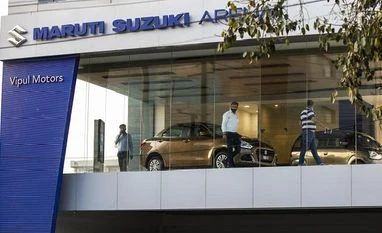High cost of acquisition due to a variety of reasons, including higher GST than all other major countries, is slowing down car demand in the country and unless the Centre and states take steps to reduce it, the industry is unlikely to experience reasonable growth, according to Maruti Suzuki India Chairman R C Bhargava.
Addressing shareholders in the company's Annual Report for 2020-21, he said after the devastating second wave of the coronavirus pandemic hitting the first quarter of FY22, the performance in the next three quarters will largely depend on how effectively people get vaccinated and observe safety protocols.
"In March 2021, we were quite optimistic about the outlook for FY2021-22. The suddenness and ferocity of the second wave of the pandemic was a surprise to all, and led to lockdowns and restrictions in most parts of the country," he wrote.
Production and sales again dropped and the recovery that had started in the previous quarter suffered a set-back. Q1 sales were limited at 3,53,600 units, Bhargava added.
Emphasising that the future outlook hinges on how the virus is contained, he said, "The performance in the next three quarters largely depends on how effectively all our citizens follow the government's advice to get vaccinated and observe safety protocols."
Bhargava further said, "If we can avert the third wave, or substantially reduce its effect, and there are no further waves, economic activities and sale of cars can improve significantly over what was achieved last year."
He also attributed the slowing down in the demand of cars to "largely because the cost of acquisition by consumers has increased due to various reasons like regulatory changes, depreciation of the rupee, increase in cost of raw materials and taxes imposed by State governments".
"The GST on cars, based on the past rates of excise duty, is much higher than the GST (or equivalent) in all other major countries of the world. It is unlikely that the car industry will experience reasonable rates of growth unless the central and state governments consider how to reduce the initial acquisition cost of car," Bhargava asserted.
More From This Section
Yet, Maruti Suzuki India Managing Director and CEO Kenichi Ayukawa said in the second half of 2020-21 there was growth after a big contraction in Q1 due to COVID-19 as "the demand for cars also followed the path of economic recovery".
"The demand for cars was driven by pent-up demand, increasing customer preference towards personal mobility and a good demand from non-urban markets," Ayukawa wrote in his address.
On the road ahead, he said, "Although the country is navigating through tough times, its economic prospects appear to be promising over the medium term. With support from SMC in terms of relevant products and technologies, the company will continue to work on all the enablers to cash-in on the opportunities."
Moreover, SMC, in its recent mid-term plan, indicated to offer relevant products such as Utility Vehicles (UV) to strengthen MSI's product line-up, promote the penetration of hybrids and introduce EVs, Ayukawa added.
"The partnership between Suzuki Motor Corporation and Toyota Motor Corporation will help the Company in gaining access to hybrid technology," he said.
)